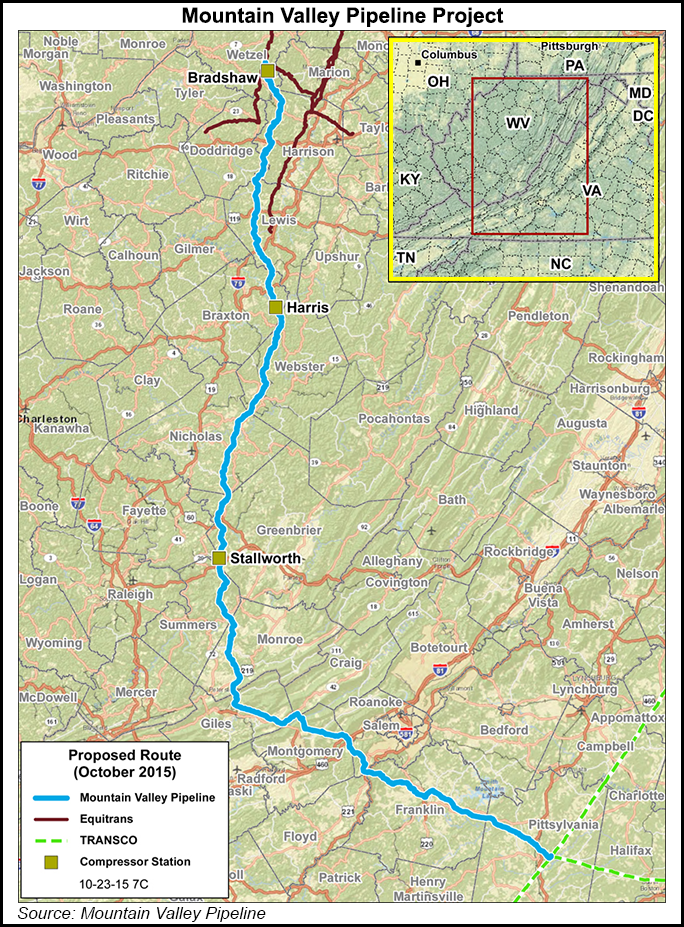NGI Archives | NGI All News Access
MVP Facing Yet Another Legal Challenge Over Endangered Species Protections
Environmental groups have filed a court challenge seeking to overturn federal approvals issued to the Mountain Valley Pipeline (MVP) under the Endangered Species Act (ESA) as part of a strategy to slow progress on another major natural gas project.

A coalition of groups including Wild Virginia, the Sierra Club and others filed a petition Monday asking the U.S. Court of Appeals for the Fourth Circuit to review certain documents — the Biological Opinion (BO) and Incidental Take Statement (ITS) that the U.S. Fish and Wildlife Service (USFWS) issued to MVP in 2017.
The documents, issued under the ESA, are required for the 2 Bcf/d, 300-mile pipeline’s federal certification.
The groups behind the latest filing appear to be taking a page out of the same legal playbook that led to the Fourth Circuit toss out of USFWS approvals issued to the 1.5 Bcf/d, 600-mile Atlantic Coast Pipeline (ACP) on two separate occasions. ACP shares many similarities with MVP.
In the case of ACP, the Fourth Circuit remanded the BO and ITS in 2017, forcing the USFWS to revise and reissue its approvals. Last month, the Fourth Circuit again tossed the documents, concluding that the USFWS still had not done enough to establish safeguards for protected species likely to face impacts from the pipeline’s construction.
As for MVP, the Sierra Club is arguing that the USFWS has failed to protect the endangered Roanoke logperch fish species. It also claims the agency didn’t set limits for the number of threatened or endangered bats that could be harmed or killed by the pipeline’s construction.
The Sierra Club, in a letter dated Monday, asked the Federal Energy Regulatory Commission to stay the BO and ITS issued to MVP, arguing that “the pipeline developer is currently engaged in construction activities that harm endangered species and their habitat.” Issues raised included the potential for sedimentation from construction activities to impact the Roanoke logperch’s habitat.
Both “citizen reports” and MVP status reports confirmed that “renewed construction activity is causing a marked increase in sedimentations problems…Notably, these severe sedimentation impacts are occurring” when MVP “is prohibited from crossing streams and wetlands. The pipeline developer has acknowledged that main threats to logperch populations include sedimentation due to upland land disturbances.”
In a note to clients, analysts at ClearView Energy Partners LLC did not rule out the possibility of construction delays resulting from the latest environmental challenge. They noted that “valid authorizations” under the ESA “are a prerequisite for the certificate generally, not merely for construction in particular areas.”
Earlier this month, the Virginia Department of Environmental Quality ordered MVP to halt construction on a two-mile stretch of the project in Montgomery County, citing “insufficient” erosion and sediment controls.
MVP has incurred hundreds of violations as it has worked through abnormally wet weather in recent years. While MVP is more than 85% complete, it has lost approvals and permits that are still pending in the face of various legal challenges. Project sponsors have been forced to delay the pipeline’s startup repeatedly, most recently pushing operations from 4Q2019 to mid-2020.
MVP would move Appalachian natural gas from West Virginia to Virginia and connect with the Transcontinental Gas Pipe Line to deliver more volumes to Southeast markets. EQM Midstream Partners LP, Con Edison Transmission Inc., WGL Midstream and RGC Midstream LLC are partners in the project.
Meanwhile, the ESA, enacted during the Nixon administration, itself is in the sights of the Trump administration, which is pursuing changes aimed at “easing the regulatory burden” associated with the law.
© 2024 Natural Gas Intelligence. All rights reserved.
ISSN © 2577-9877 | ISSN © 2158-8023 |
